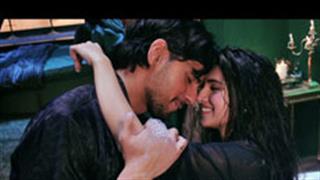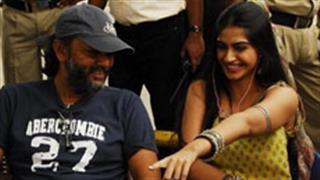Thank you. It's very kind of you to say that. But it's not about how far I'm going to stretch. It's about how far the directors are willing to push. It's always been about the director and I've always maintained that.
We actors, unfortunately, end up walking away with all the credit but it has to go to the directors. I'm very fortunate that somebody like Rakeysh picked me to play Roshan in Delhi 6.
We have tried something new. I think Rakeysh is somebody who you've grown to expect to change and to introduce a new narrative and a new language to cinema. I do hope that people appreciate the effort we've put into Delhi 6.
People always ask you - What have you learnt from your failure. Let's flip the question. What have you learnt from your success?
Not to take it seriously (smiles). That's the one thing everybody who've been successful will tell you. The day you start taking success seriously, it'll take it back from you the next day.
Your success is an acknowledgment of your hard work and hopefully good work. But in order to maintain it, you have to continue to work hard if not harder. If you don't, as fast as you caught it, it's going to go away.
You will be the first Indian actor to put on an accent throughout the film. Was it then necessary to put on an enunciation to justify your character?
There is an interesting story behind this. We worked out an accent. I had an accent coach because Roshan was born and brought up in New York. So we felt that Roshan should have a strong New York accent.
We did a few readings and worked on it for a month. I was then ready with the lingo.
Once I was ready, we did another reading with Rakeysh and recorded it, and when I heard it again, I said, "You know what I feel is going to happen is that this film is so rooted to India and Indian culture and it's so meant for the Indian audience that it can alienate them to some extent because they might have trouble understanding what I was saying".
The NRI's wouldn't have a problem accepting it but back home in India things might go wrong. I had this thought because I was watching an English movie channel in India where this movie had English subtitles.
I enquired why an English film should have an English subtitle to which they explained that a lot of times our Indian audience cannot understand the accent. So they want to read and know exactly what the person speaks. That made a lot of sense to me.
So what did you and Rakeysh finally decide?
 I suggested Rakeysh to have a twang but not a very heavy accent because we could've confused our Indian audience. He thought about it for a very long time and still wanted to go with the accent.
I suggested Rakeysh to have a twang but not a very heavy accent because we could've confused our Indian audience. He thought about it for a very long time and still wanted to go with the accent. He convinced me to do another reading and by the end of it he finally agreed with me. We went for a faint hint of the accent. So in spite of training for a month we eventually did not go for it while we were on the sets. You will notice it once you see the film.
After Sarkar Raj making it to the 'Top Ten' films at the U.K box office last year, do you think the overseas audience are now accepting a change in cinema by not being tempted by just candy floss films?
I've always believed that a good film works and a bad film doesn't. Movies like Black, Sarkar and Sarkar Raj which are song-less films have proved that they can collect huge amounts of money at the box office and do extremely well.
All these films have gone down as one of the highest grossing films of that particular year. Having said that, I do believe that there is a bit of a glass ceiling.
We as Indians want to see certain elements in our films. We love our song, our dance, our emotion, and if you see the trend, it's not only about candy floss films. It's about a film which has poetic justice.
Song, dance and emotions are the three strong pillars of Indian films which I think are required and that's when your audience opens up. So although I think Sarkar Raj did break the shackles last year, it will still take more time until the overseas completely accepts a song-less film.
Please share with us your unforgettable experience working with Waheeda-ji and Rishi-ji.
(Smiles) They are two of my favourites. I've worked with Waheeda aunty before in Om Jai Jagdish. It was a sheer honour to work with her again. She is the most dignified and beautiful lady on Earth.
She's such a wonderful person to be on the sets with. She has this aura about her which lights up everyone's life and I can't be more privileged that I have already done two films with her.
Actors go through their entire career not having an opportunity to work with her because she doesn't do lot of work. I was very excited that she had agreed to do Delhi 6.
I was equally, if not slightly more, excited about Chintu uncle (Rishi Kapoor) because he was my childhood hero. If there was anybody after dad for me, it was Chintu uncle.
 So there I was, with one of my childhood idols. Guess what; he didn't let me down at all in terms of whatever I expected of him in the screen space I share with him in the film. He is sheer brilliance. He is so effortless yet stylish and just the class with which he pulls off his performances is commendable and makes you very envious.
So there I was, with one of my childhood idols. Guess what; he didn't let me down at all in terms of whatever I expected of him in the screen space I share with him in the film. He is sheer brilliance. He is so effortless yet stylish and just the class with which he pulls off his performances is commendable and makes you very envious.It's been ages that we Indians have played that one song in every marriage taking place in India. The last one I remember was 'Didi Tera Dewar Deewana' from Hum Aapke Hain Kaun. I guess 'Genda Phool' has arrived with a bang.
(Smiles) What's wonderful about 'Genda Phool' as oppose to the rest of the album is that it's a fantastic fusion between a folk song and a modern orchestration and production. What's heartening about 'Genda Phool' is that it makes you feel that India still has its heart in its roots.
You give them (audience) something which is embedded in Indian culture; they're going to go for it. I'm so happy about that. It's an old folk song which Rahman and his team reproduced with the infusion of modern beats. The song epitomises the India of today.


















